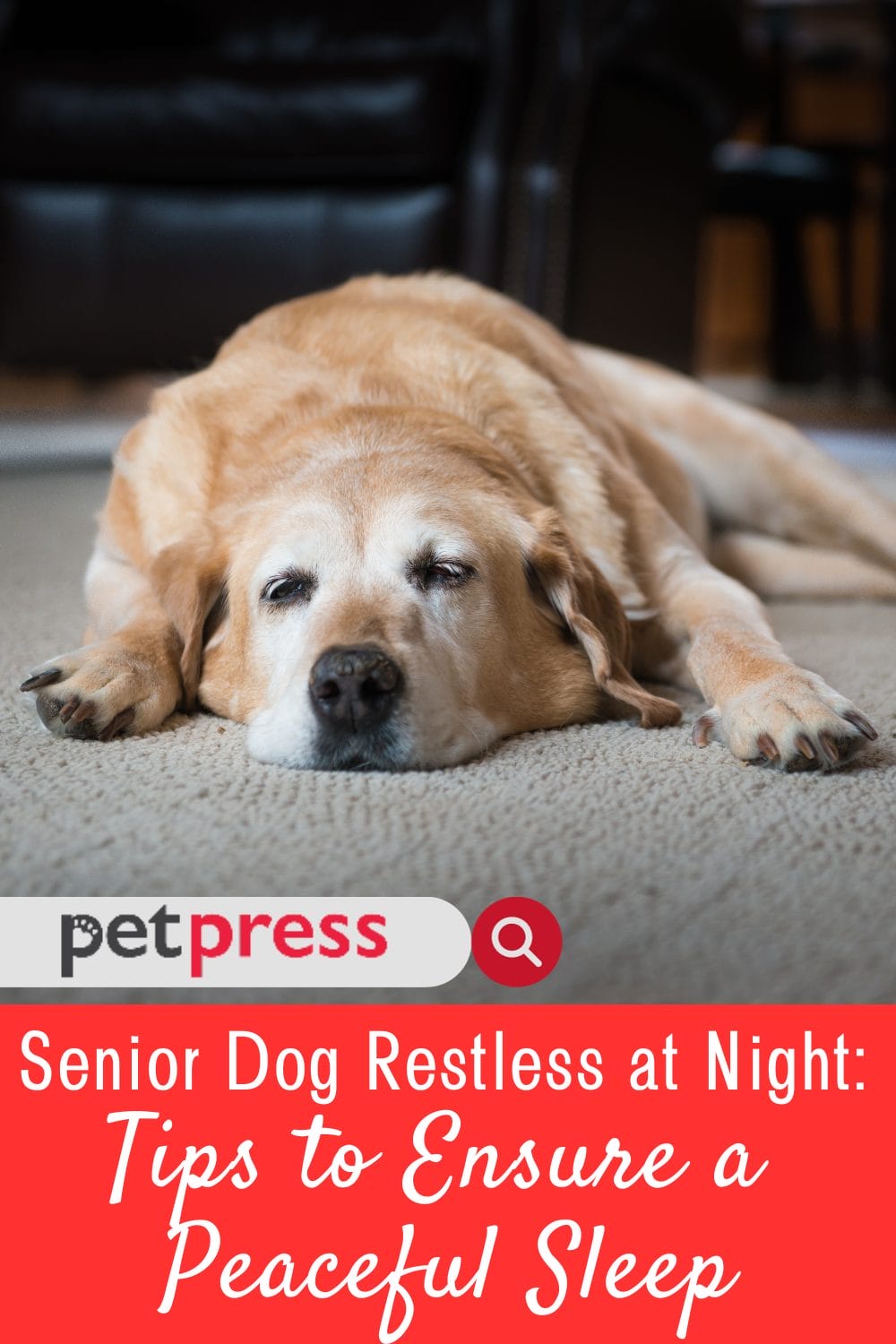
Aging gracefully isn’t just a challenge for humans; our dogs face their share of twilight troubles, with senior dogs restless at night being a common issue. Isn’t it heartbreaking to see your gray-muzzled companion pacing back and forth, looking lost in the wee hours?
Fear not! This comprehensive guide is filled with practical tips, seasoned advice, and a generous dollop of empathy. By the end of this blog, you’ll be equipped with the knowledge to help your senior dog reclaim the peaceful nights they deserve.
So, let’s dive in and unlock the secrets to a serene slumber for your restless senior canine!
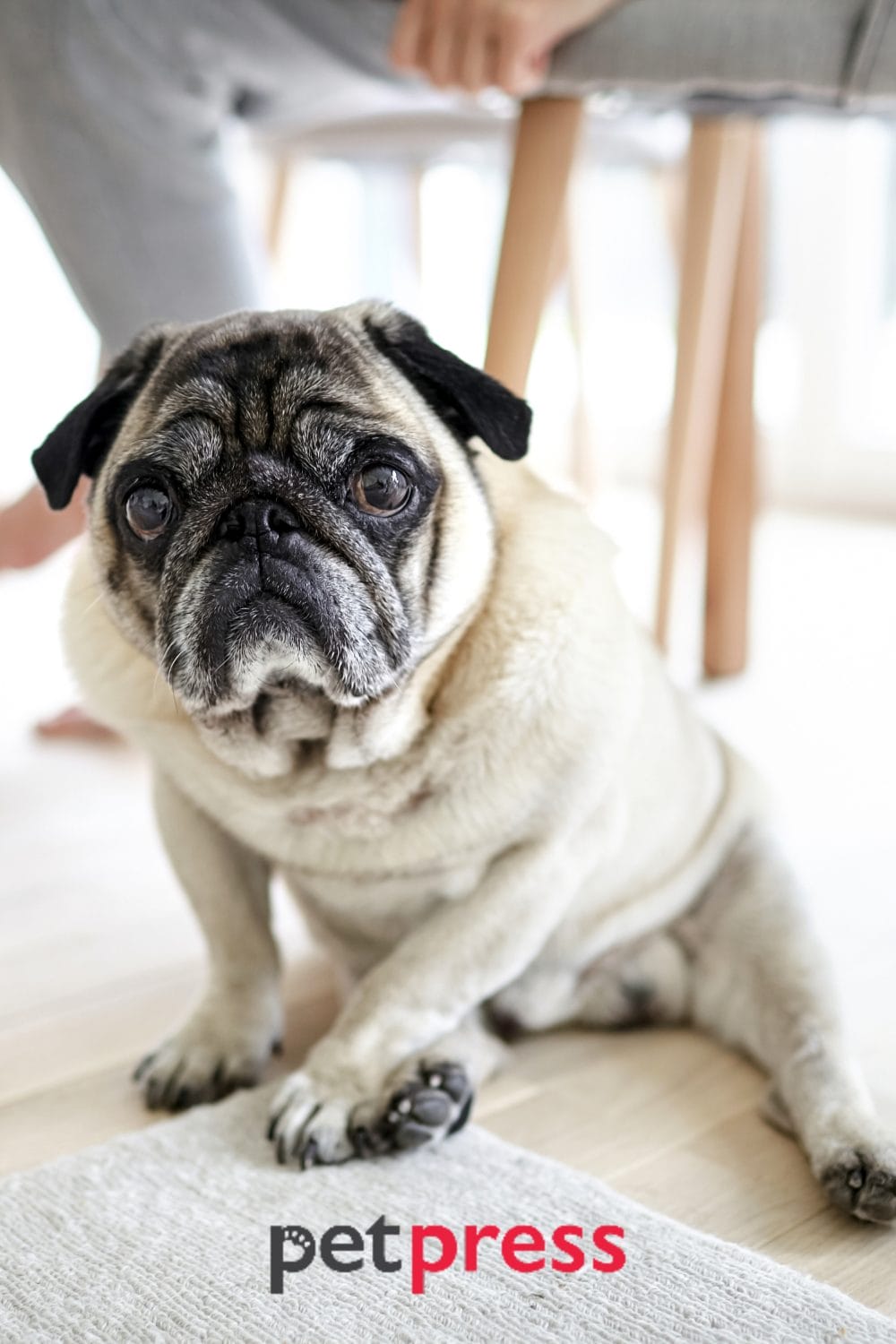
The Impact of Impaired Sleep Quality in Dogs
Getting a restful night’s sleep is crucial for our furry friends, just as it is for us. As dogs age, they may also encounter a decrease in sleep quality, which can significantly impact their overall health and well-being.
According to Dr. Karen Becker, DVM, “Dogs who don’t get enough restful sleep become anxious and agitated”. This can manifest in destructive behaviors, depression, and a compromised immune system.
Furthermore, poor-quality sleep can exacerbate health conditions such as arthritis or cognitive dysfunction syndrome in senior dogs.
The ripple effect of sleep deprivation on our senior dogs can also extend to pet owners, disrupting their sleep and causing stress. Therefore, it is essential to address the issue of nighttime restlessness for the sake of both your senior dog and your peace of mind.
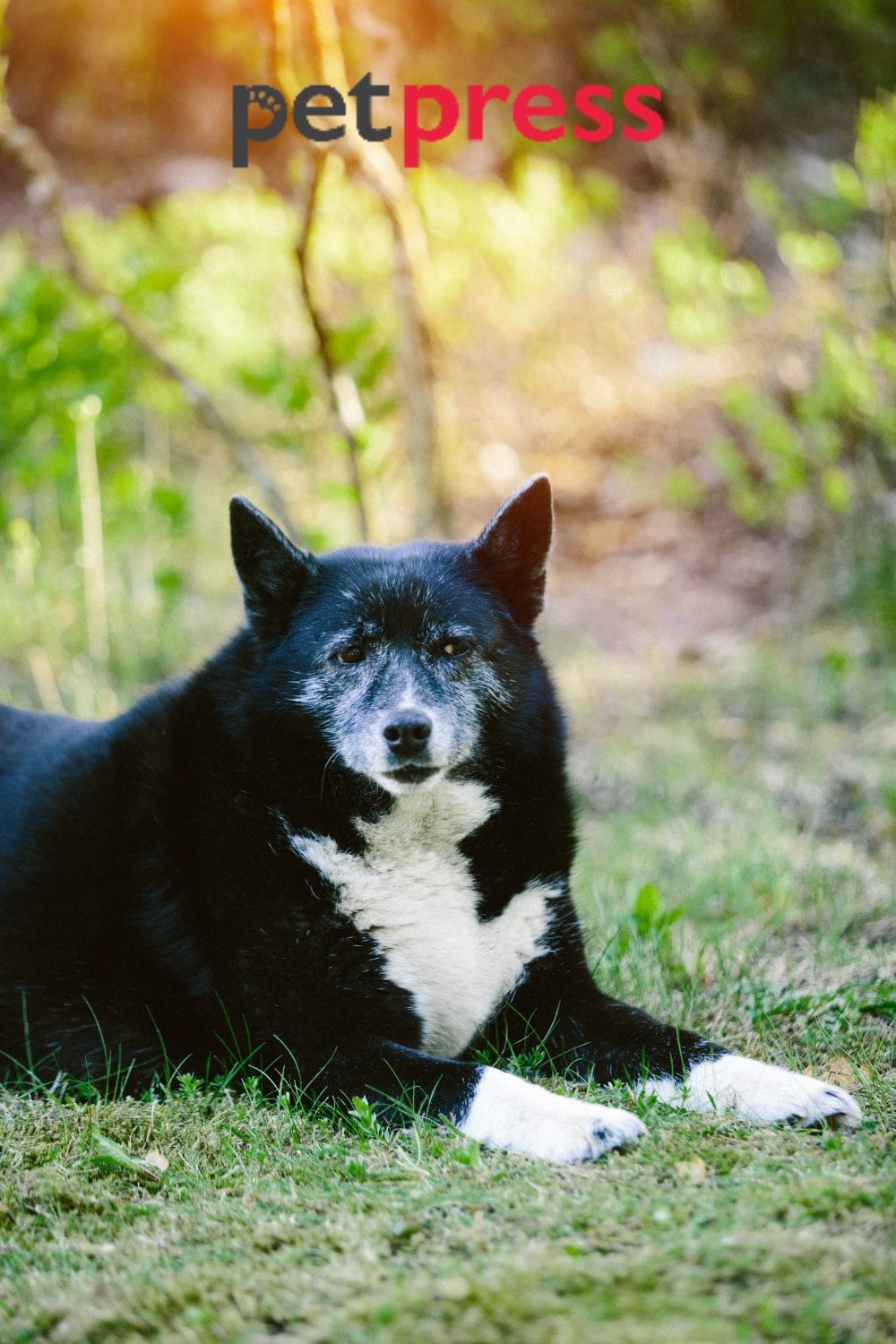
Understanding the Causes of Restlessness
As our dogs age, they may experience various physical and cognitive changes that can disrupt their sleep patterns. From arthritis pain to cognitive dysfunction, several factors can contribute to their restlessness at night.
By understanding these causes, you’ll be better equipped to address the issue and help your senior dog find comfort.
- Arthritis and Other Physical Discomforts: As your dog ages, they may develop health conditions such as arthritis, hip dysplasia, or mobility issues that can cause discomfort and pain.
- Cognitive Dysfunction Syndrome: Just like humans, dogs also experience age-related cognitive changes that can affect their sleep. Doggy dementia can lead to confusion, disorientation, and restlessness at night.
- Separation Anxiety: As our furry friends grow older, they may sometimes feel separation anxiety when they’re apart from their beloved owners for a long time. This can result in anxious behaviors like restlessly pacing or expressing their feelings through gentle whines at night.
- Underlying Health Issues: Restlessness in senior dogs can also indicate underlying health issues like urinary tract infections, kidney disease, or thyroid problems. If you notice these sudden changes, it’s important to consult with a veterinarian to address any health concerns.
- Change in Routine: As dogs grow older, they naturally prefer a predictable routine, finding solace in familiar habits. Introducing alterations to their daily schedule, such as a new feeding or exercise routine, can trigger feelings of unease and restlessness during the night.
- Increased Need to Urinate: As dogs age, their ability to hold their bladder for extended periods can decrease. This can result in frequent trips outside at night, disrupting their sleep and yours.
- Changes in Sleep-Wake Cycle: As dogs enter their senior years, they may experience changes in their sleep-wake cycle. Similar to humans, older dogs may experience difficulty falling asleep or staying asleep for extended periods.
By understanding these possible factors, you can pinpoint any underlying health concerns that might impact your dog’s sleep. Armed with this insight, you’ll be better equipped to assist your beloved companion in achieving a tranquil and rejuvenating night’s rest.
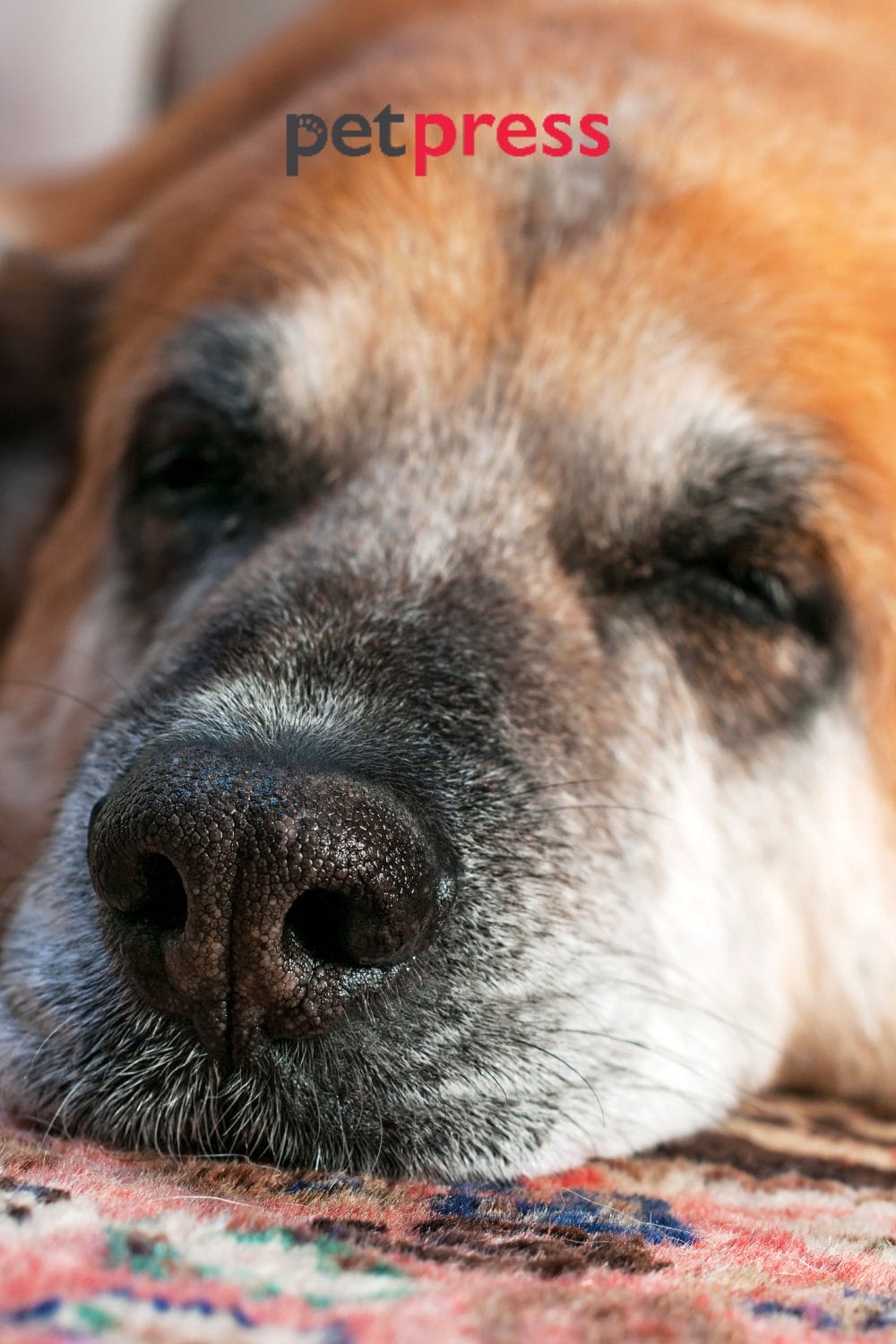
Tips to Help Your Senior Dog Sleep Better at Night
Provide a Comfortable Sleeping Environment
Creating a comfortable environment is vital for your senior dog’s sleep quality. Invest in a supportive and orthopedic bed that alleviates joint pain and provides ample cushioning.
Place the bed in a quiet, undisturbed area to minimize disruptions. Regulate the temperature to ensure it’s neither hot nor cold for your furry friend.
Regular Exercise and Mental Stimulation
Physical exercise and mental stimulation are significant in managing senior dogs’ restlessness. Engage your dog in regular walks, gentle playtime, or other suitable activities to tire them out before bedtime. Mental stimulation through puzzle toys can also help tire their minds, aiding in a peaceful sleep.
Addressing Pain and Discomfort
If your senior dog is in pain or discomfort, it’s best to seek professional help. They can recommend appropriate pain management options, like tailored medications or supplements, to meet your pet’s needs. Remember to always follow professional guidance when adjusting your pet’s medication.
Establish a Bedtime Routine
Establishing a consistent bedtime routine can signal your senior dog that it’s time to wind down and prepare for sleep. Create a relaxing routine by incorporating gentle activities like brushing or massaging your dog, followed by a short walk or bathroom break.
Consistency is key; this routine will help regulate their internal clock, promoting better sleep patterns.
Minimize Anxiety and Distractions
Provide a calm and secure environment by minimizing loud noises, closing curtains to reduce outside stimuli, and using white noise machines to drown out sound disturbances. Additionally, consider using anxiety-reducing tools such as calming pheromone diffusers or anxiety wraps.
Consulting a Veterinarian for Unresolved Restlessness
If your senior dog continues to experience restlessness at night despite all efforts, consult your veterinarian. A thorough physical examination and necessary tests can help rule out any underlying medical conditions contributing to their discomfort.
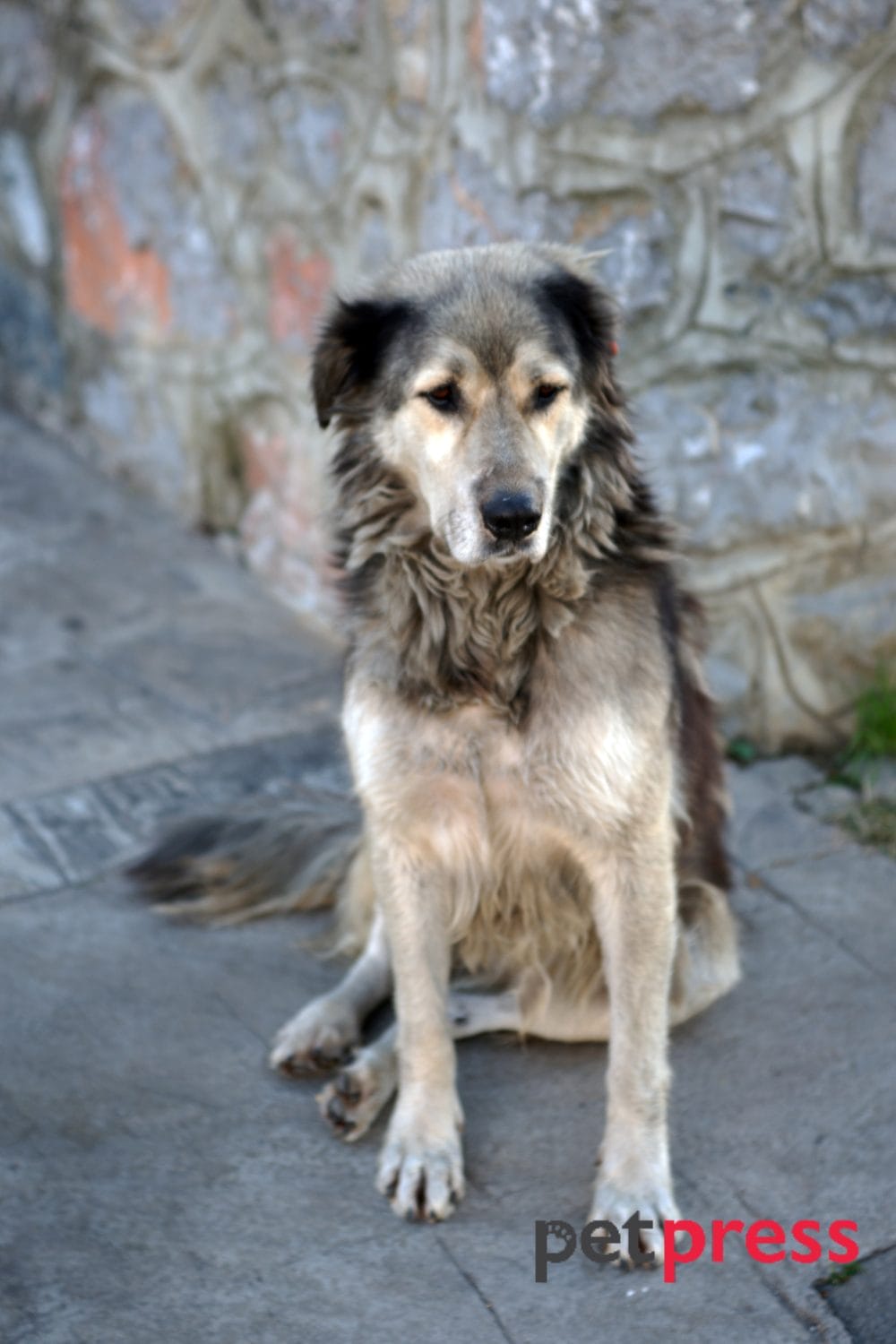
The Role of Diet in Managing Nighttime Restlessness
Optimizing Your Senior Dog’s Diet for Better Sleep
What we feed our pets can significantly affect their sleep patterns. Higher-quality diets often enhance overall health, including sleep. Dietary tweaks can be critical in managing their symptoms for senior dogs, particularly those restless at night.
- Balanced Nutrients: Consuming a well-balanced diet packed with vital nutrients, antioxidants, and Omega-3 fatty acids can contribute to enhancing joint health and cognitive function.
- Avoid Late Night Feeding: Feeding your furry friend too close to bedtime might make them uncomfortable and disturb their sleep. To avoid this, try to schedule their meals earlier, giving them enough time to digest before they hit the hay.
- Hydration: Hydration is crucial, but balance is key. Excess water late in the evening may increase the need for bathroom breaks, disrupting their sleep. Ensure your dog gets most of its water intake earlier in the day.
- Consider Dietary Supplements: Some supplements, like melatonin or chamomile, can help your dog relax and sleep better. However, it’s always important to consult your veterinarian before adding new supplements to your furry friend’s diet.
Remember, every dog is unique, and what works for one might not work for another. Discussing significant dietary changes with a veterinarian is always best to ensure they suit your senior dog’s needs.
By implementing these strategies, you’ll be well on your way to helping your senior dog achieve a more restful night’s sleep.
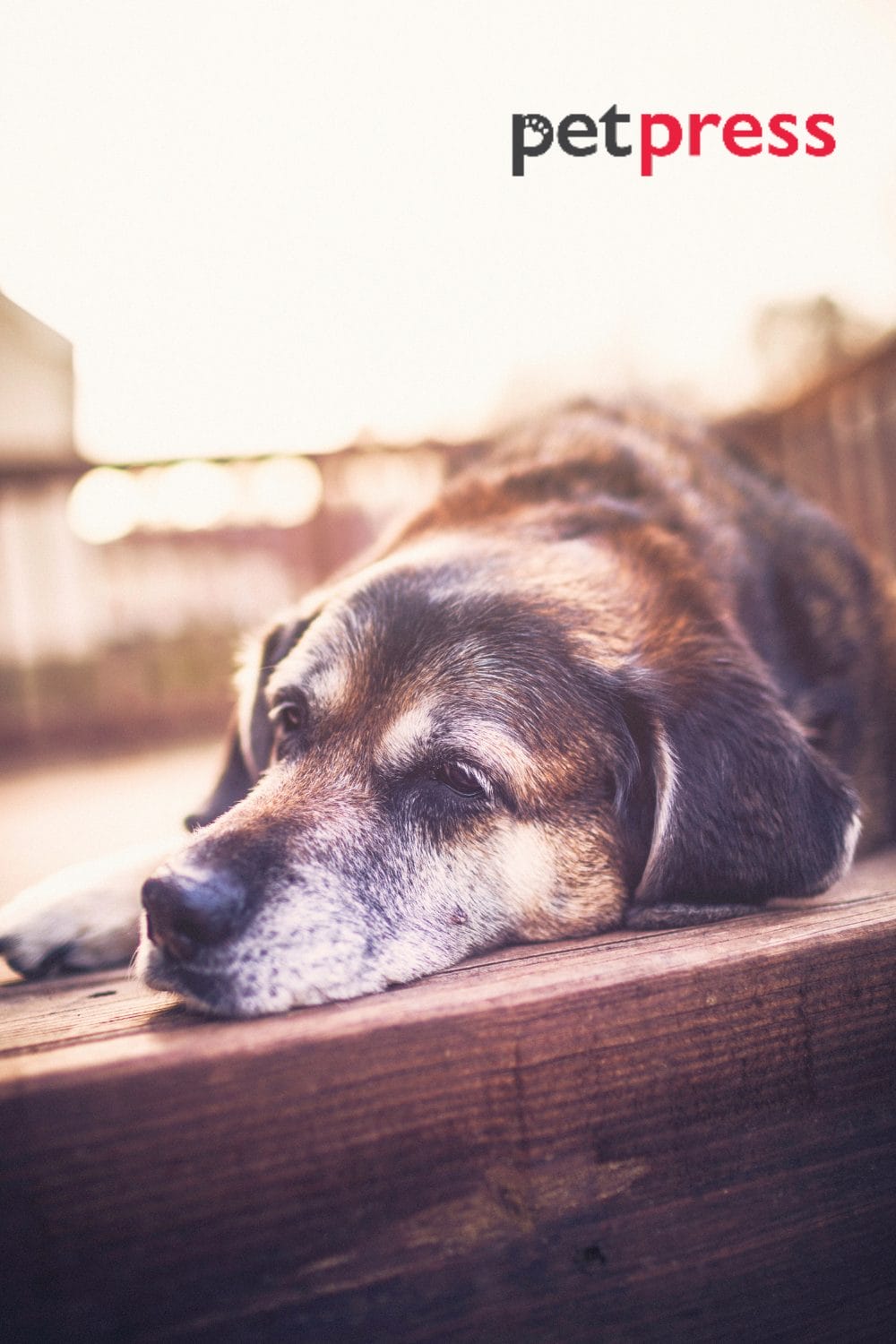
The Impact of Environmental Changes on Senior Dog’s Sleep
As dogs age, they can become more sensitive to their surroundings. But, it can lead to increased anxiety and restlessness at night. Environmental modifications can help soothe your senior dog and promote a better sleep quality.
Temperature Control
A comfortable sleeping temperature is essential for good sleep, especially for senior dogs with decreased thermoregulation abilities. Ensure the temperature in your home is not too hot or too cold, and consider using a cooling or heating pad to regulate their body temperature.
Noise Reduction
Exterior noises, such as cars, barking dogs, sirens, etc., can disrupt your senior dog’s sleep. Consider closing windows and using white noise machines or fans to drown out external noises.
Light Control
Excessive exposure to light can disrupt your dog’s natural sleep cycle. Ensure their sleeping area is dark, and consider using blackout curtains if necessary. Additionally, keep lights low during nighttime bathroom breaks to avoid overstimulation.
Familiarity and Comfort
As dogs age, they become more attached to their surroundings and may feel anxious or stressed when placed in a new environment. Try to maintain your senior dog’s usual sleeping area and routine whenever possible to promote familiarity and comfort.

When to Seek Professional Help for Your Restless Senior Dog
If your senior dog’s sleep restlessness persists despite your efforts to mitigate it, it may be time to seek professional help. Frequent sleep disturbances are problematic for your peace and could indicate underlying health issues that need immediate attention.
You should consult a veterinarian if:
- Changes in Sleep Patterns Persist: If your senior dog consistently struggles to sleep despite implementing the strategies discussed, it may be a sign of something more serious needing professional attention.
- Noticeable Behavioral Changes: If your senior dog seems more irritable, less active, or less responsive during the day due to inadequate sleep at night, it’s time to consult a veterinarian.
- Excessive Daytime Sleeping: While senior dogs tend to sleep more than younger dogs, excessive daytime napping could indicate an underlying medical condition.
- Lack of Appetite or Weight Loss: Sleep disturbances can significantly impact your dog’s appetite and weight. If you notice a decreased appetite or unexplained weight loss, consult your veterinarian.
Consulting a veterinarian is the best course of action regarding your senior dog’s health and well-being. They can provide valuable insights into managing sleep restlessness and ensure any underlying medical conditions are addressed.
Conclusion: Ensuring a Restful Night for Your Aging Companion
In summary, understanding why your senior dog is restless at night can be challenging but can be managed effectively with patience, care, and the right strategies. To improve your elderly companion’s quality of life, employ behavior modification, dietary adjustments, and environmental changes, and seek professional help when needed.
Each dog is unique, so consult a veterinarian for tailored solutions. Ensure their comfort, health, and love as they enter their twilight years. Taking these measures helps them achieve better sleep and honors our bond.
Share this guide with a friend if it’s helpful for their restless senior dog. Better sleep for our furry friends means better sleep for us, too! Pass on the knowledge!
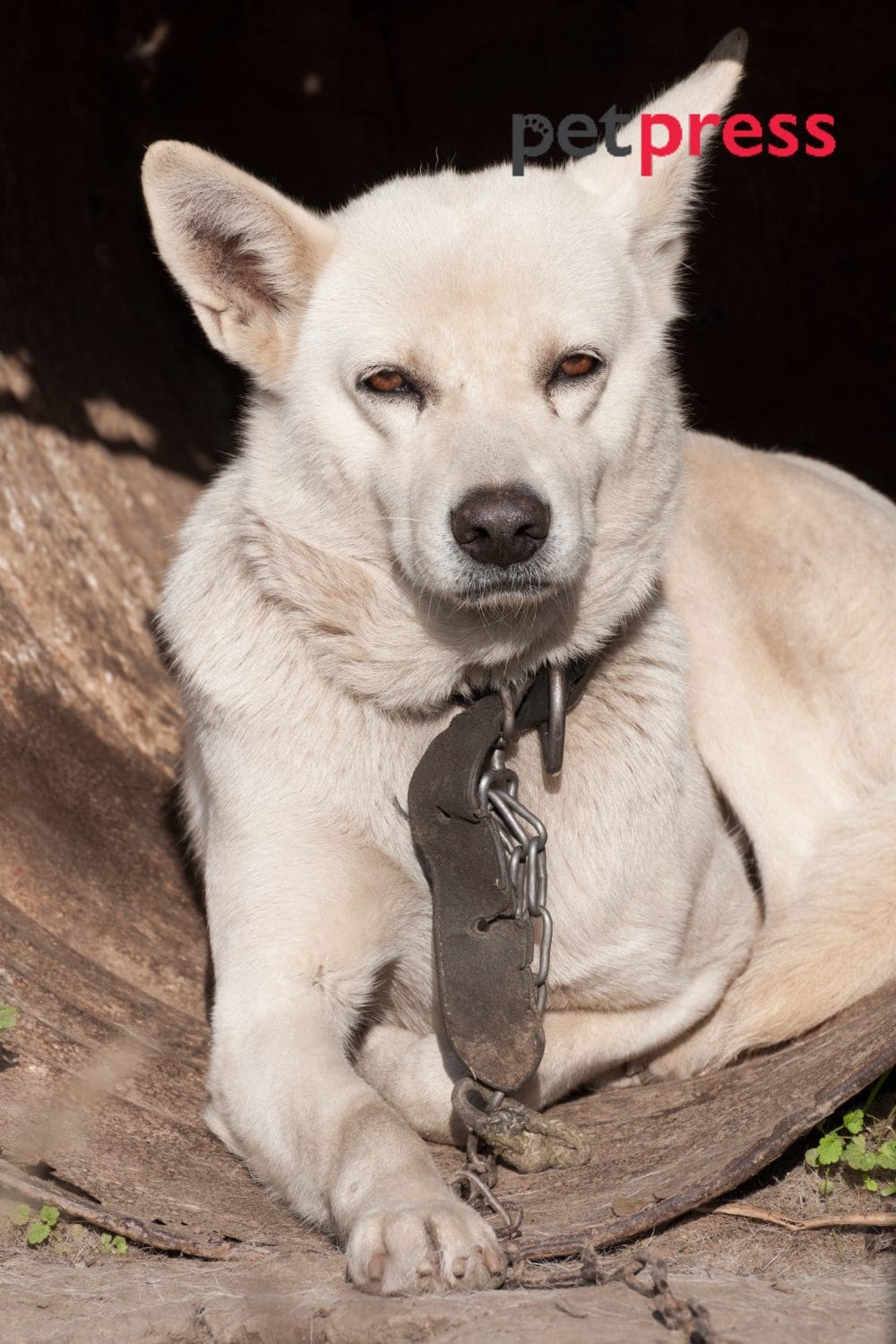
Frequently Asked Questions (FAQs)
As dogs age, they may experience physical discomfort, cognitive decline, or even medical conditions contributing to restlessness. Addressing these issues and creating a comfortable environment can aid in improving their sleep.
Investing in a supportive bed, regulating the temperature, and placing the bed in a quiet area are ways to create a comfortable sleeping environment for your senior dog.
While diet can influence overall health, consult your veterinarian before making any dietary changes. They can guide you in selecting appropriate foods tailored to your senior dog’s needs.
If your senior dog’s restlessness continues, it’s recommended to consult with your veterinarian. They can further investigate underlying medical conditions or provide additional guidance based on your dog’s individual situation.
Yes, regular physical exercise and mental stimulation can tire out your senior dog’s body and mind, leading to more restful sleep.
Related Posts:
10+ Heartwarming Senior Dog Quotes to Melt Your Heart
- Can Pets Sense Pregnancy in Humans? - October 1, 2024
- 6 Unusual Pets for Adventurous Owners: From Tarantulas to Pigs - September 30, 2024
- Feline Hyperthyroidism: Early Signs and Modern Treatments - September 30, 2024


GIPHY App Key not set. Please check settings